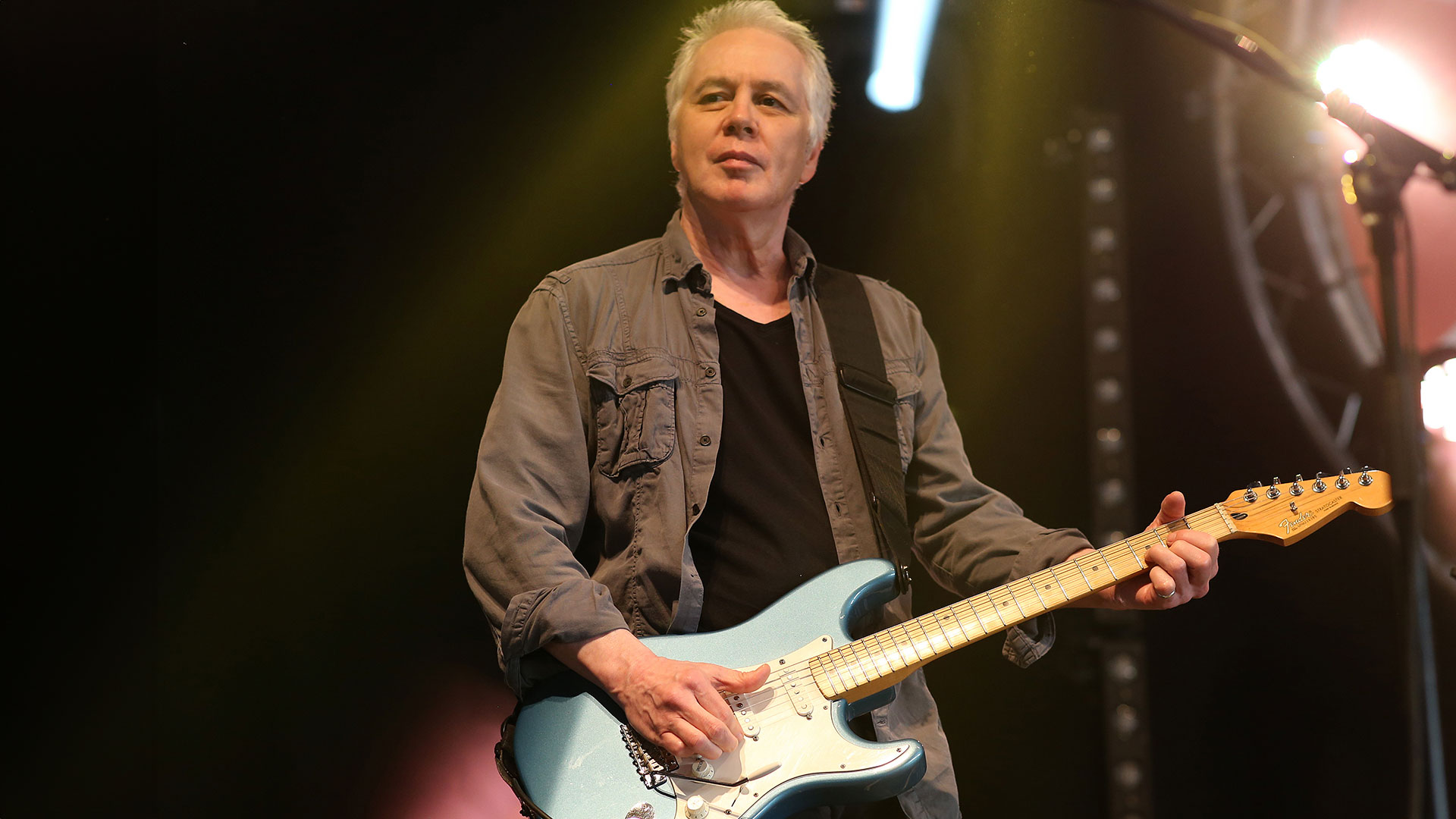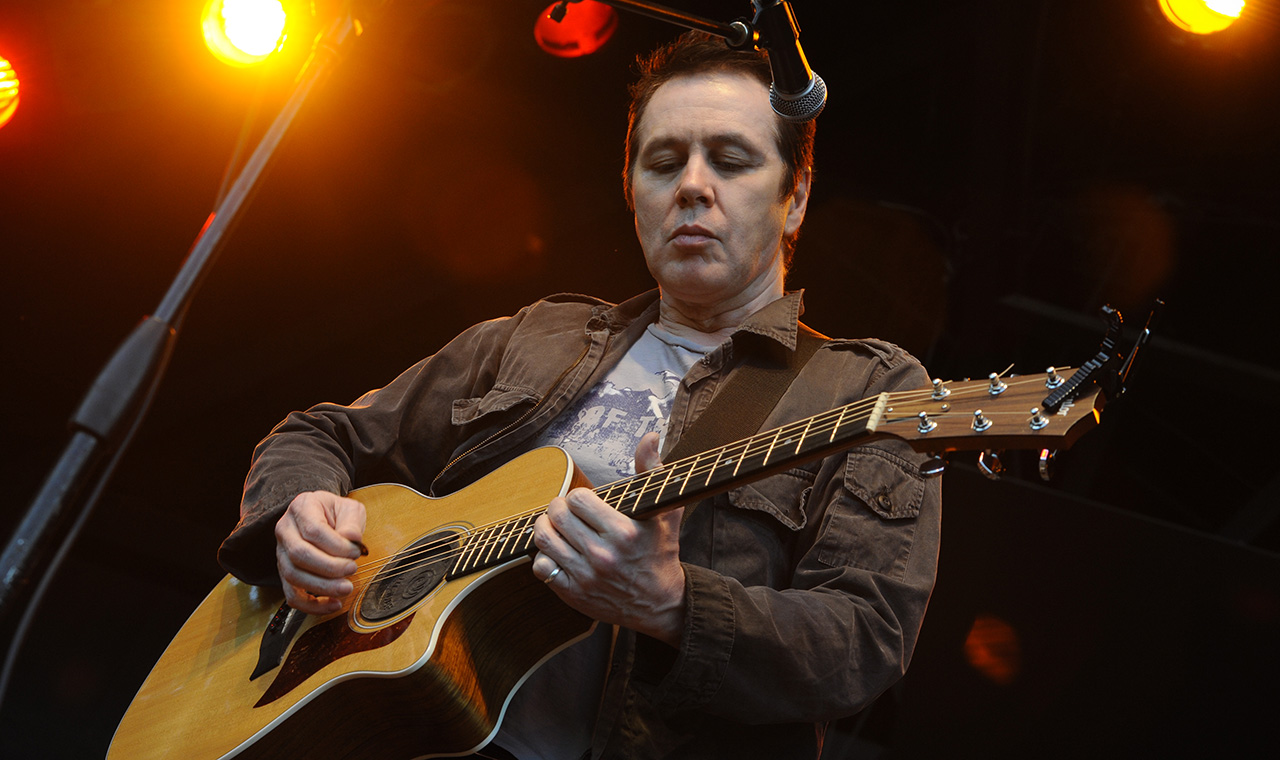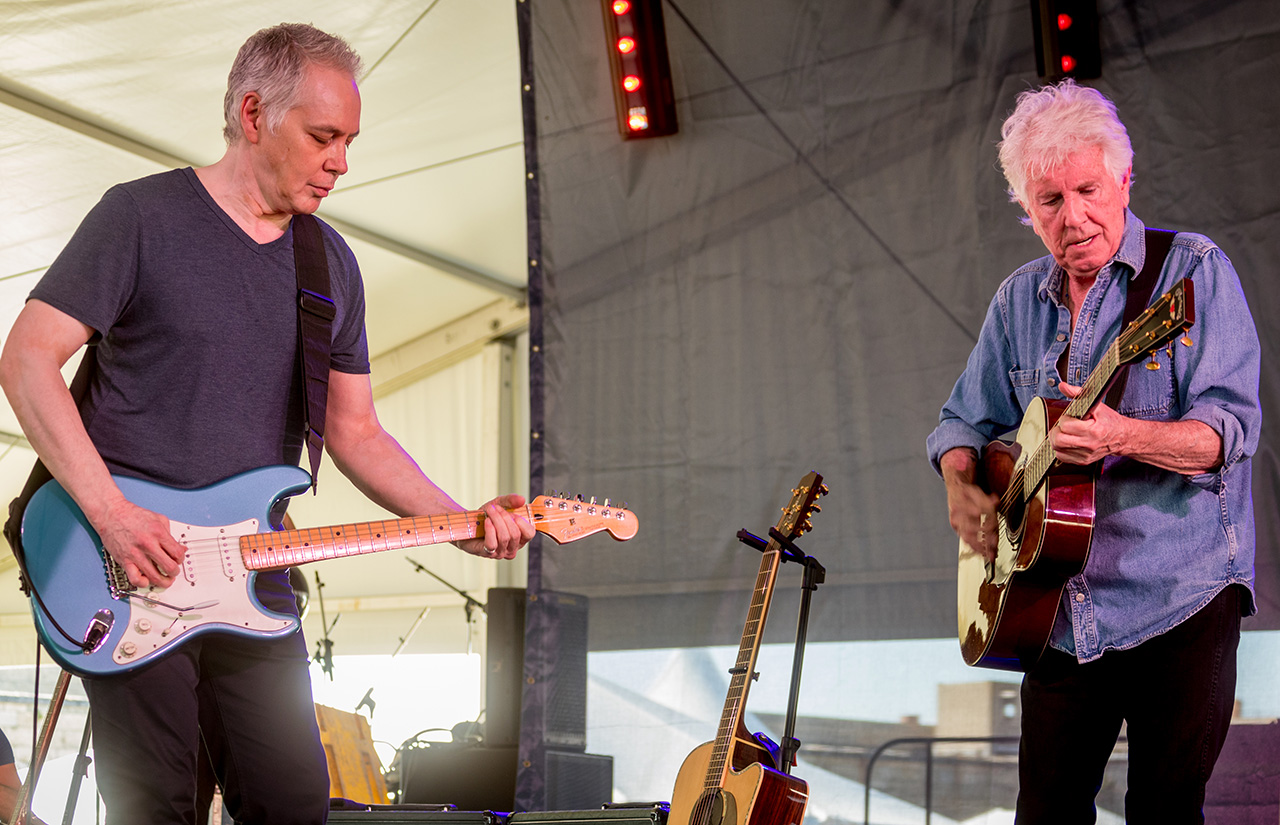“Mick Ronson came to see one of the Springsteen shows, and he was just so proud of me. He had a classic rock ‘n’ roll existence, but I love him for all that”: Shane Fontayne on the kindness of Ronson, serving the Boss – and playing Stairway for Jimmy Page
His career highs include surprising Stevie Van Zandt with an improvised part, jamming with U2, and playing Stairway To Heaven with the Heart sisters while Jimmy Page was guest of honor

Shane Fontayne came to America in the ‘70s, aged 21, and once he’d befriended Mick Ronson he set off on an epic guitar journey. In the ‘80s he played with the Mamas & the Papas before hooking up with Lone Justice as they toured with U2.
Fontayne joined Mick Taylor, then quickly moved on to Bruce Springsteen's “Other Band,” which toured the world in 1992 and 1993. Later he became a member of the Kennedy Center Honors house band for seven years. notably backing Heart’s Ann and Nancy Wilson for a soaring cover of Zeppelin’s Stairway to Heaven as Jimmy Page watched.
“He was too cool to say anything about that,” Fontayne says of meeting Page after the show. “Just because it’s a staple, it’s almost like a nightmare to endure somebody else performing it! if it turns out well, maybe you’re more surprised than anything. I’m not trying to put words in his mouth – but they all seemed happy.”
Fontayne’s long-running gig with Graham Nash came to an end about a year ago, and he’s looking to get back on the road. “I’ve thrived on the trust of people I’ve worked with,” he reflects. “John Lennon said he was a primitive musician who’d had no schooling but learned enough to express himself. That describes me.”
How did you hook up with Mick Ronson?
“I met Mick and his wife Susie in late ’75 and told them, ‘I’m going to be going to the States in a few month.’ They said, ‘We live in New York – look us up.’ I got to New York in ’76 after hitchhiking around the US and called Mick.
“I went down to rehearsals with him and it just worked. I’d come to America to play with American musicians, but I found myself with Mick! It was life-changing. He was one of the sweetest men I’ve ever known. We went up to Woodstock, all lived in the same house and recorded together.
Get The Pick Newsletter
All the latest guitar news, interviews, lessons, reviews, deals and more, direct to your inbox!
How did working with Mick shape you as a young player?
“I’ve never considered that. He implicitly trusted me to be a foil for him. He was the sort of player who’d say, ‘Don’t worry about the sound. Just start recording, because in 10 minutes you might lose your opportunity to capture the moment.’”
Why didn’t anything come out of those sessions?
“Mick probably was not a solo artist. His strength, at that time, was the big pop-rock mega-album. His manager was trying to push Mick in that direction. Ultimately, the material probably wasn’t strong enough and the focus changed. But our personal relationship endured – I saw Mick shortly before he died after at one of the Springsteen shows I did.”

In the ‘80s you worked with Lone Justice on their album called Shelter, which differed greatly from their debut record.
“I’d gotten to know Greg Sutton, who’d become the bass player for Lone Justice. They were like the it band; they had that country punk thing and they were media darlings for a moment. But Jimmy Iovine had taken over as manager, and the singer, Maria McKee, had started to change things.
“Greg brought me into audition as they were working on the song I Found Love, which Maria wrote with Stevie Van Zandt. I went down there late one night with my baritone six-string bass, and I got a chance to sit in. At the end of the take, I remember Stevie laughing, ‘Well, I wasn’t expecting that!’ I essentially played what’s on the record. Jimmy called the next day and said, ‘You made a lot of people very happy last night,’ and I was in the band.”
Lone Justice opened for U2 in support of The Joshua Tree. What was that like?
“I remember standing backstage and watching when The Edge started Where the Streets Have No Name; when Bono came out, I swear I saw a halo around the guy’s head! I don’t know… there was a light around him, and I don’t think it was a light from the stage; there was just a presence about him.”
During the last show of the tour, Lone Justice and U2 jammed on a rendition of Sweet Jane. How did that happen?
“I was watching U2 through the curtain at soundcheck. After they stopped, Larry Mullen Jr. beckoned me over, and Bono invited Maria and myself to do Sweet Jane. I was like, ‘We do a version of Sweet Jane every night!’ They had me show them how we did it. I was like, ‘This is probably a once-in-a-lifetime kind of thing.’”
After Lone Justice, you toured with Mick Taylor, where you sort of played the role of Keith Richards.
“I’m a guitarist who essentially wants to play with abandon. If the person who hired you feels they can trust you, those are the situations that have been the easiest for me to play in. I was doing my thing and Mick was all good with it. It was essentially a situation where we would just go out, play, and have a great time.
“We did some ’Stones material, like Can You Hear Me Knocking? which is one of those songs where part of Mick’s disenchantment was maybe not getting songwriting credit – though I didn’t talk to him about it. Mick had such a huge signature sound. I learned a lot from him. His playing is mesmerizing to me.”
I don’t know how long I jammed with Bruce; it could have been five minutes, it could have been 20
In the early ’90s you joined Bruce Springsteen’s “Other Band” after he folded the E Street Band. How did that happen?
“I got a call from Jimmy Iovine, saying Bruce had seen Lone Justice on Saturday Night Live, which we’d done in ’86 during Christmas. Bruce had seen a re-run and said to Jimmy, ‘Who’s the guitar player?’ So an audition was set up in Los Angeles
“I had a pedalboard at the time, which is somewhere in Bruce’s locker, which I was running in stereo. I remember bringing out that pedalboard, and I asked his team for a couple of amplifiers, and maybe I took my Gretsch Tennessean with me.
“So, I get down to the audition, and Bruce’s right-hand man, if you want to call him that, says, ‘Don’t be nervous about anything. He’s gonna make you feel so comfortable.’”
“I was excited, but I don’t think I was overly nervous. We started playing – and I don’t remember what we played, but it was in the key of B. It’s an interesting key; it’s great on guitar, We jammed, and it was one of those spark-flying moments.
“I don’t know how long we played; it could have been five minutes, it could have been 20, but after we took a break, Bruce goes, ‘Man, that's a lot of twang.’ I said, ‘Too much?’ And he said, ‘Uh uh!’ It was just a feeling that, sensibility-wise, I’m not a technical player; I trust my gut and instincts, and I respond.”
“I was just responding to what was happening in the room – and it seemed to work for him. Later in that session, he said, ‘Man, with some of the stuff you’re playing, I wish I’d had you play on the album’.
“His material was so forgiving for a player like me; it’s not too complicated, so I stumbled – there was just a sensibility to it that I wouldn’t feel like that happened. That made me a good fit.”
Did you get the sense that Bruce trusted you as a player?
“Bruce’s confidence – regardless of any questions we were asked or any feelings from fans who had doubts about his choices – never wavered in front of us. He never gave us anything but total belief.”
There’s an album of unreleased material that you recorded with Bruce. What’s the story there?
“After he did Streets of Philadelphia, he called me to come play on some recordings. His manager, Jon Landau, felt that lyrically the album wasn’t there. A couple of the songs we recorded – one being Secret Garden – were released; I believe the title of the album was to be Waiting on the End of the World. Whenever I see Bruce, he’s told me that he might still [release the recordings] – that he wants to get those sessions out there.”

What led to the end of your time in Bruce’s band after the ’93 tour ended?
“There was never a disbanding; the tour came to an end, and there was no more. The commitment had run its course. I think the next thing that he pivoted to was Blood Brothers, and putting the E Street Band back together. That took on a second life.”
Mick Ronson came out to see you at before the tour ended.
“He actually passed on my birthday. He came to see one of the Springsteen shows, and he was just so proud of me. Mick had kind of a classic rock ‘n’ roll existence – he probably drank too much. But he didn’t say things he didn’t believe, and I love him for all that. I’m grateful that he wanted to be there.”
I actually asked Jimmy Page if he played the solo on The Kinks’ You Really Got Me
How did you go about performing Stairway to Heaven with Ann and Nancy Wilson in 2012?
“I was part of the house band for the Kennedy Center Honors, so I ended up playing that song and solo. I didn’t know it [the solo] was that iconic beforehand! It was only when I started seeing all the comments that I realized it.
“The hard rock thing, at the time, hadn’t so much been my kind of thing. So yes, Stairway is a classic rock staple, and I was obviously familiar with it, but it wasn’t something that had spoken to me so much – and it’s a long song!
“You want to be respectful and do not necessarily what they would have done, because you’re not them. So, it’s about what I would want to hear if I was in the audience. In that regard, I wanted to recreate the solo that had been done on the record.
“With Stairway, because I’m not a Jimmy Page kind of player, even though I did get a Les Paul for that show, I listened to the solo. I wanted to try and emulate it with the right spirit and render it somewhat closely – but not just have it be a regurgitation. Fortunately, at the time, I didn’t realize how iconic it was. [laughs]”
How did it go when you met Jimmy afterwards?
“Seeing how good he looked with gray hair is what got me to decide to stop coloring mine! But I actually asked him if he played the solo on The Kinks’ You Really Got Me.
“In these moments – you’ve got a moment here, and somebody could be speaking a completely different language coming back at you – he basically said that he’d been at that session, but I don’t think he played the solo.”
What’s next for you?
“I was on the road for some years with Graham Nash, until separating from Graham over a year ago. I’ve been using the time to continue playing, writing, and potentially doing another solo album; I did one over 20 years ago. And I'm looking to get back on the road; that’s what I miss.”
Andrew Daly is an iced-coffee-addicted, oddball Telecaster-playing, alfredo pasta-loving journalist from Long Island, NY, who, in addition to being a contributing writer for Guitar World, scribes for Bass Player, Guitar Player, Guitarist, and MusicRadar. Andrew has interviewed favorites like Ace Frehley, Johnny Marr, Vito Bratta, Bruce Kulick, Joe Perry, Brad Whitford, Tom Morello, Rich Robinson, and Paul Stanley, while his all-time favorite (rhythm player), Keith Richards, continues to elude him.
You must confirm your public display name before commenting
Please logout and then login again, you will then be prompted to enter your display name.
“It’s really quite genius, but also hard to learn – it sounds insane, but sometimes the easiest songs still get me nervous”: Kiki Wong reveals the Smashing Pumpkins song she had the most trouble with
That time Stevie Wonder jammed with Stevie Ray Vaughan... and played SRV's number one Strat














